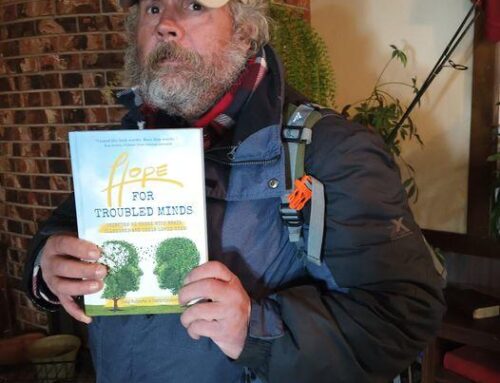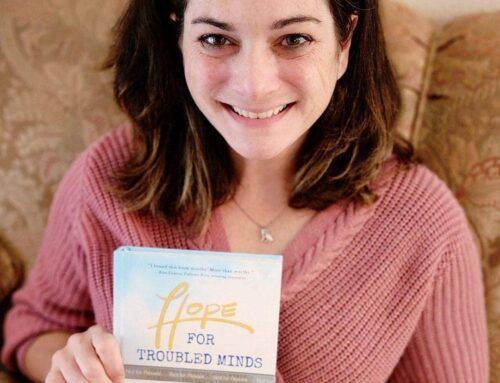Rev. Roberts, you have bipolar disorder.
What? I was in a medication-induced stupor. My mind was in a haze. Was I dreaming? Bipolar? I had heard of it, but I couldn’t connect with it. What did it mean for me? I couldn’t take it in, so I turned over and went back to sleep. Maybe dreams would take this dreadful diagnosis away or at least infuse the hope I needed to handle this new reality.
Rest wouldn’t come as I tossed in a hyper-vigilant wakefulness, staring beyond the walls. I got up and walked to the central nurse’s station. The nurse on duty wore a gentle and kind expression. She had a glow about her and seemed to float above her rotating chair.
She asked what I was looking for. I told her the diagnosis I was given and that I wanted to understand what it meant. Suddenly, her expression turned dour and her glow became a dark cloud. She spoke with otherworldly authority I felt too frail to question.
You will get a divorce. You will no longer work in pastoral ministry. You will spend the rest of your life in and out of psych hospitals.
Was she for real? I don’t know. It may have been a nightmare. Indeed, it was a nightmare, but it was also happened.
This was February of 1995. I was 31 years old. I was married and had two young children — ages two, and not quite a year. I was the pastor of a village church poised to grow. I was publishing articles, devotions, and reviews in an increasing number of journals and magazines. Now I was faced with the prospect of it all coming to a screeching halt.
I lay in bed that night lost in a cognitive fog. I was weary, but couldn’t sleep. I was weighed down by a foreboding sense of a bleak future. Paralyzed by grief, I cried; loud sobs, wails, and moans flowed from a void in my soul I had not known before.
No one heard. Nobody came. No one comforted me. While I believed God was with me even in such a dark valley, it seemed God was mocking me, putting me in my place for sins unknown to me. The notion that God was hemming me in offered no assurance. In that moment, I felt God was not a loving Father but a malicious dictator, emasculating me on a divine whim.
In the midst of my spiritual paralysis, I somehow found the strength to get up. I opened the door and walked down the hall, not knowing where I was going or what I would find. I saw no one. At first. Then, a young man with gentle features appeared by my side. He laid his hand on my shoulder and led me to a cushioned couch in the lounge.
I poured out my soul to him. Longing for what my life had been. Anger at what it now was. Fear of what it would become. I told him the prognosis I had been given:
Divorce. Unemployment. Hospitalization.
How could I possibly handle this?
He looked at me with a soft yet penetrating gaze and said, It doesn’t have to be that way.
I breathed in these encouraging words. Was he an angel sent by God or just an aide working third-shift? Were his words prophetic or just wishful assurance? Time would tell. In that moment, however, they were just enough to suggest a glimmer of hope on the horizon.
I never saw that angelic aide again. But I remember his words well and find comfort in them on nights I fear a bleak future. I share this reassurance when I sit with someone on a psych unit, in my support group circle, or over coffee with someone cast under a shadow of despair.
It doesn’t have to be that way.
Being diagnosed with a serious mental illness (schizophrenia, schizoaffective disorder, bipolar disorder, and major depression) does not strip us of the prospect of leading purposeful lives. Certainly, SMI introduces risk factors that threaten stability. The odds are stacked against us. According to statistics from the National Institute on Mental Health (NIMH) and the National Alliance on Mental Illness (NAMI):
- In couples with at least one mentally ill partner, divorce rates are as much as 80% higher.
- Over 35% of persons receiving benefits have a mental health disability.
- Mental disorders account for 5.5 million visits to emergency departments.
The initial prognosis I received was not an exaggeration. If anything, it shielded me from some of the even more harsh realities individuals with bipolar disorder face:
- An estimated 82.9% of people with bipolar disorder have serious impairment, the highest percent among mood disorders.
- The life expectancy of someone with bipolar is 20 years below the average.
- Over 15% of us take our own lives.
Divorce. Disability. Death. What possible hope can be found in such statistics? They say numbers don’t lie. They simply reflect reality. Given this, the odds of someone with a serious mental illness leading a rich and rewarding life are slim.
But,
It doesn’t have to be that way.
Shortly after I received this bleak prognosis, I met an attending psychiatrist. He wore a long pony-tail and John Lennon glasses. His lips curled up into a broad Cheshire Cat grin like he had a surprise to share if people were ready to receive it. I walked into his office and slumped down in his chair. The conversation went something like this:
So what brings you to our humble abode?
They say I have bipolar disorder.
And what does that mean?
(annoyed) You tell me.
I’d rather you tell me.
Well, it means my brain is messed up. And I’ll never be the same again.
In what way?
Look, I’m tired. I’m on a boatload of meds. Just tell me what I’m facing. How serious is this? Will I get a divorce? Can I return to work? How long will I be in the hospital and will I be coming back?
I can’t say.
What do you mean you can’t say?
I mean it’s too early to tell. For now, you will be in the hospital until we find the right meds for you to be stable. It would be good to see a marriage counselor to explore how this will impact your relationship. You will also need to take some time off work. Beyond that, I can’t say.
His Cheshire grin had turned into a look of determined hope.
There is one thing I want you to do. Read this. (handing me the book An Unquiet Mind: A Memoir of Mood and Madness). It’s a memoir by a leading bipolar researcher. She has bipolar herself and this is her story.
Discover more from Delight in Disorder
Subscribe to get the latest posts sent to your email.







